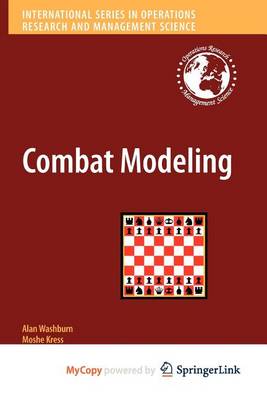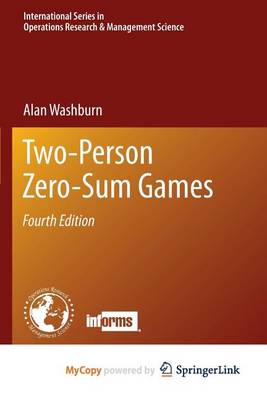International Series in Operations Research & Management Science
2 primary works
Book 134
"Combat Modeling" is a systematic learning resource and reference text for the quantitative analysis of combat. After a brief overview, authors Washburn and Kress present individual chapters on shooting without feedback; shooting with feedback; target defense; attrition models; game theory and wargames; search; unmanned aerial vehicles; and terror and insurgency. Three appendices provide a review of basic probability concepts, probability distributions, and Markov models; an introduction to optimization models; and a discussion of Monte-Carlo simulations. Drawing on their many years of experience at the Naval Postgraduate School in Monterey, California, Washburn and Kress have created a reference that will provide the tools and techniques for analysts involved in the underpinnings of combat decisions. This is a book that can be used as a military manual, reference book, and textbook for military courses on this vital subject.
Book 201
Two-person zero-sum game theory deals with situations that are perfectly competitive-there are exactly two decision makers for whom there is no possibility of cooperation or compromise. It is the most fundamental part of game theory, and the part most commonly applied. There are diverse applications to military battles, sports, parlor games, economics and politics. The theory was born in World War II, and has by now matured into a significant and tractable body of knowledge about competitive decision making. The advent of modern, powerful computers has enabled the solution of many games that were once beyond computational reach.
Two-Person Zero-Sum Games, 4th Ed. offers an up-to-date introduction to the subject, especially its computational aspects. Any finite game can be solved by the brute force method of enumerating all possible strategies and then applying linear programming. The trouble is that many interesting games have far too many strategies to enumerate, even with the aid of computers. After introducing ideas, terminology, and the brute force method in the initial chapters, the rest of the book is devoted to classes of games that can be solved without enumerating every strategy. Numerous examples are given, as well as an extensive set of exercises. Many of the exercises are keyed to sheets of an included Excel workbook that can be freely downloaded from the SpringerExtras website. This new edition can be used as either a reference book or as a textbook.

